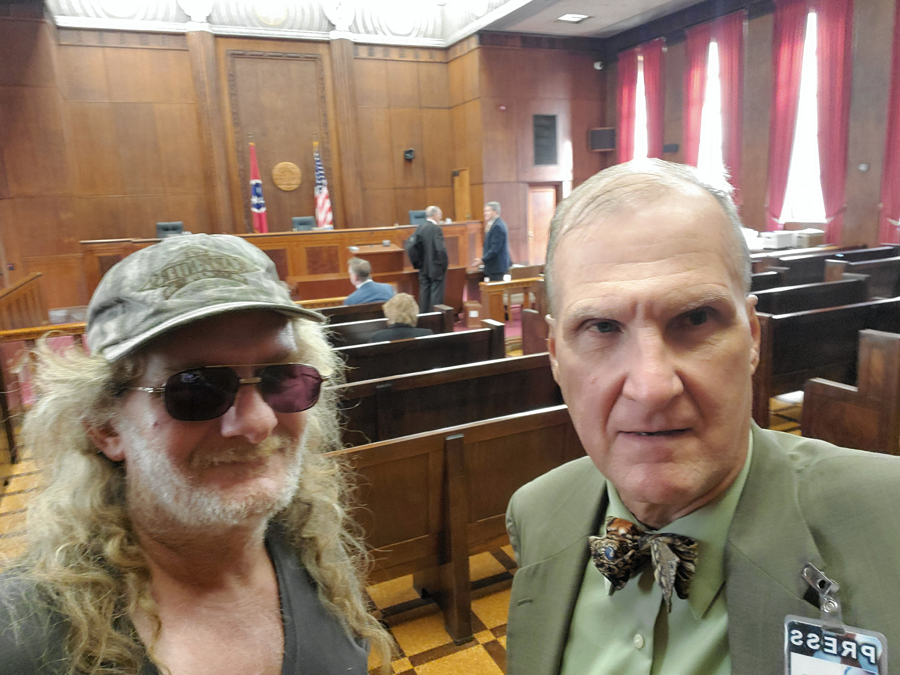
Fraud by two agencies in Tennessee state government holds that Gran’ma (Marianne Tulis, for example, having finished her breakfast at my house), soccer moms, clergymen and teenagers can use the public roads only if they apply for a license under the carrier (shipping) law in chapter 15 of Tenn. Code Ann. § Title 65. (Photo David Tulis)
CHATTANOOGA, Tenn. Sunday, Sept. 1, 2024 — The constitution grants the general assembly no authority to license and declare a privilege of Gran’ma’s use of the public highway. No law forces Gran’ma to become a trucker to use the street leading to her dear friend’s nursing home and skilled nursing care room at the end of Hallway No. 9.
The people own the roads and are free to travel upon them by right.
A single qualification exists for use of the highways and freeways. If you are using the roads as your place of business, as a shipper or carrier, you must pay the privilege tax and have a driver license, registration and probably insurance coverage.
The existence of the departments of revenue and safety does not suddenly make enjoyment of these rights a crime, at least not as a matter of law. In practice, yes, cops and deputies criminalize the enjoyment of rights. But not as a matter of state and federal law.
‘Not construed as in derogation’
The Tennessee uniform administrative procedures act points up the limits of statute in the hands of agencies to which they are directed.
(1) This chapter shall not be construed as in derogation of the common law, but as remedial legislation designed to clarify and bring uniformity to the procedure of state administrative agencies and judicial review of their determination and shall be applied accordingly.
(2) Administrative agencies shall have no inherent or common law powers, and shall only exercise the powers conferred on them by statute or by the federal or state constitutions.
T.C.A. § 4-5-103. Construction of chapter.
The existence of agencies means no derogation of your constitutionally guaranteed rise period it also means that agencies cannot abrogate your common law rights
➤ The motor carrier law at T.C.A. § 65-15-106 points out the duties of the department of safety, ones that are strictly commercial.
a) The department of safety is vested with the power and authority, and it is its duty, to license, supervise and regulate every motor carrier in the state and promulgate rules and regulations pertaining thereto.
Tenn. Code Ann. § 65-15-106
Grandma, with her use of her driver’s license perhaps near an in, has a license under Title 65, as you notice above. This law is the carrier or trucker law. Grandma has her license as a trucker, believe it or not. Title 65 is the authorizing statute for the Tennessee Driver’s license. The rules of the road, which police enforce as poachers and deputies have lawful authority to enforce, is in Title 55, motor and other carriers.
➤ Under Title 55, motor and other vehicles, the department of safety and homeland security has authority for administrative rules only. Title 55 is administrative law managing the authority given DOSHS in Title 65, chapter 15, carriers to “license, supervise and regulate” every motor carrier (yes, Gran’ma as licensee is one of them).
The commissioner is authorized to establish administrative rules and regulations concerning the licensing of persons to operate motor vehicles, in this state, for the purpose of ensuring the safety and welfare of the traveling public.
55-50-202. Establishment of rules and regulations.
Traffic enforcement is in federal jurisdiction and has a federal subject matter and administrative authority. The administrative nature of license is the legal basis of DA Coty Wamp’s dismissal of the criminal case against me for using my car with a bit of missing red tail light plastic the day before Thanksgiving 2023.
➤ The state adopts federal law to regulate transportation via the department of safety:
(1)The Tennessee Department of Safety, Division of Driver License Issuance hereby adopts the federal motor carrier safety regulations, and all subsequent amendments thereto, promulgated, approved, and adopted by the United States Department of Transportation contained in Title 49 of the C.F.R. §§ 383 (1992), 386 (1991), 390 (1989), and 391 (1989). Authority:T.C.A. §§ 55-50-202 and 55-50-410.
1340-01-13-.23 ADOPTION OF DEPARTMENT OF TRANSPORTATION SAFETY RULES AND REGULATIONS
It is well established law in Tennessee that the regulatory authority of the state over transportation does not implicate the right to travel.
“[Robert Booher’s] right to travel within this state or to points beyond its boundaries remains unimpeded. Thus, not only has the appellant’s right to freedom of travel not been infringed, but also, we cannot conclude that this right is even implicated in this case. Rather, based upon the context of his argument, the appellant asserts an infringement upon his right to operate a motor vehicle on the public highways of this state. This notion is wholly separate from the right to travel. The ability to drive a motor vehicle on a public highway is not a fundamental ‘right.’ See Goats v. State, 211 Tenn. 249, 364 S.W.2d 889, 891 (Tenn.1963) (emphasis added); Sullins v. Butler, 175 Tenn. 468, 135 S.W.2d 930, 932 (Tenn.1940) (citations omitted). Instead, it is a revocable ‘privilege’ that is granted upon compliance with statutory licensing procedures [citations omitted]” [emphasis added]
State of Tennessee v. Robert K. Booher, 78 S.W.2d 953 (1997)

Ed Soloe, left, an unemployed handyman, is a leading Gnome of Tennessee, concerned about regaining the people’s lost liberties and willing to study law to get there. (Photo David Tulis)
‘Driver’ is federally defined
Ed Soloe, one of the Gnomes, has been a steadfast companion in our lawsuit defending the right to travel and the right to use motor vehicles without a motor vehicle insurance policy, David Jonathan Tulis v. department of revenue, docket No. 23-004. A student of law, he continually thrills us with insight on the Tennessee financial responsibility law, which I’m fighting to have admitted per law, agency obedience to which will halt the Eye of Sauron surveillance project that attacks 12,000 Tennesseans every week with stinger revocation letters.
Says Mr. Soloe, “My thoughts have been simply the fact that every driver is on NDR,” the national driver registry. “Remember, 55-50-504 requires all issuance, suspension etc. of licenses to comply with federal rules and regulations. That would include definitions. The NDR is a federal database.
“Any ‘driver’ in the database would be defined by federal definition of driver, which we know is commercial.
“That’s why I place emphasis on the ‘classified AND commercial’ aspect of 55-50-101 et seq [The uniform classified and commercial driver license act of 1988]. That’s why authority to license is at Title 65 for motor carriers, and why in Title 55 it only gives authority for administrative rules and regulation concerning licenses, and not actual authority to license. The authority of Title 55 is used by DOSHS to adopt federal safety motor carrier rules and regulations.
“All must comply with federal definitions.”
-
382.107 Definitions (Code of Federal Regulations)
Driver means any person who operates a commercial motor vehicle. This includes, but is not limited to: Full time, regularly employed drivers; casual, intermittent or occasional drivers; leased drivers and independent owner-operator contractors.

